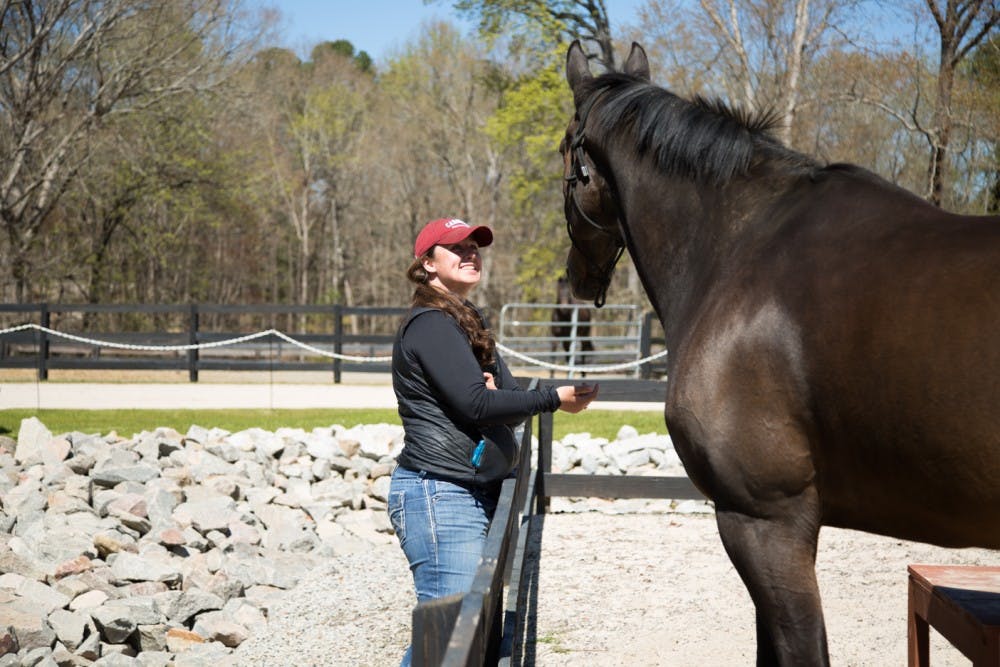The South Carolina equestrian team travels 30 minutes to Blythewood every day to prepare for competition, but much of the group's time is dedicated to preparing someone else: the horses.
Despite the distance to practice the Gamecocks take time to care for each of the 27 horses at the barn. The riders provide the necessities for the horses, such as grooming and medicating them. However, the riders don’t oversee the horses alone.
Barn manager Maggie Barton works with the athletes and horses and has been with South Carolina's program for five years.
“[The horses] work hard enough for us, we would like to take care of them,” Barton said.
The horses are usually ridden six times a week: two days jumping, two days flat and two days mixing both. Gear varies between competitions, but saddles are provided especially to the horses who have back problems. Barton said that English riders tend to bring their own saddles since they are lighter to pack.
The athletes work with a different horse each week. Practices last about an hour, then the riders spend 30 to 45 minutes on the maintenance of their given horses. Barton said riders will cool down the horses and get their heart rate down, similar to a stretch break for people after exercising. The riders also place poultice, a drawing agent for inflammation, on the horses' legs as a preventative measure after jumping.
Because each horse is used for competition, they are kept shaved. Maggie said that it is better for them health-wise to ensure there is no fungus. The horses also receive glucosamine shots and daily vitamins.
Though it's good that the athletes work with each of the 27 horses for training purposes, Barton said that it can be a challenge.
“The most frustrating thing is sometimes if you don’t have a horse that likes different riders — they might be a one-person horse — and so that's difficult and frustrating for you as a rider,” Barton said.
The South Carolina equestrian program’s horses were all donated, most from the coaches' close contacts. Sometimes, horse owners look to sell or donate a horse but have trouble deciding on a place. Because of this, the program grants the owners a one-month trial with the horse to make sure that it will be a good fit for the program's needs.
"We obviously want the best for the horses, so we might say, 'We just don’t think that they're going to hold up for our program, but here are some other options for you to look into,'" Barton said. "Just because the amount of work that they do as athletes — the horses themselves as an athlete — is a lot.”
Most of the horses are middle-aged and have had previous competition careers.
When South Carolina was in need of horses, head coach Boo Major asked Barton if the riders could use her 14-year-old horse, Ollie, who Barton has owned for nine years.
Barton said that she was riding him as much as she could, but it wasn't very often.
“He’s going to be like a little kid who hasn’t been out to play. He’ll just be wild and have a lot of energy, which he did at first," Barton said. "Now, he has come quite a long way just being used.”
Each of the Gamecocks helped train Ollie to get him competition-ready. South Carolina currently uses him as a flat horse because he needs more training, but Ollie will be competing in the SECs and nationals this year.
Nationals is always held in Texas, which is a challenge for the horses because of the long distance. However, the only time the horses from South Carolina travel are to SECs and nationals, and riders usually have different horses for every competition.
“They literally pull out of a hat who will ride what horse and then they'll do the same for the other school. So, one girl from Georgia will ride Frank and one girl from USC will ride Frank and then whoever has the higher score will win the point,” Barton said.
Even after the day's practice is complete, Barton’s scene doesn’t change. She lives in an apartment at the barn and has a view of all 27 horses.
“I tell everyone that they're my children,” Barton said. “Them being out here, standing on a beautiful day without any blankets, and actually getting to be horses and enjoying it just makes my heart happy.”

